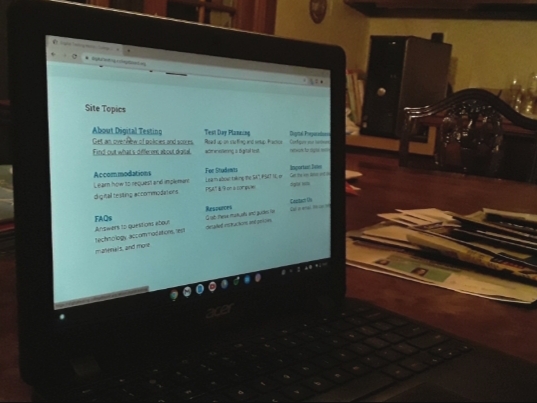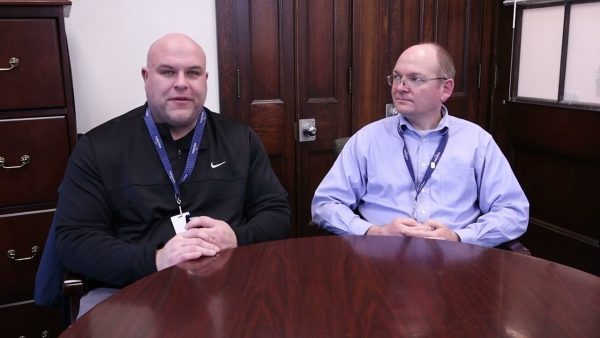Changing the standard
College Board announces that SATs will be going digital

265845091032101
Testing Tips: College Board explains the new format of digital SATs and provides a mock online test for students to try. Brian Martin, ACT prep class teacher, said, “The biggest benefit comes from students taking practice tests and then reaching out to their teachers about things that don’t make sense.” Photo by: Sage Spirk
When the time comes to start thinking about college, many juniors and seniors naturally end up taking the Scholastic Aptitude Test (SAT) and use it in their application—some taking it once, others taking a repeated try for a better score. This year, the routine played out as it has in the past: students show up to school, are given an answer and question book, and try to complete all the questions in the English and math section in a given amount of time. However, as of this year, College Board announces that changes will be made for students who will be taking the SATs in 2024, for they will now be digital.
“Many colleges have dropped the requirement for the SAT as part of their application,” Ian Callon, math teacher, said. “I think the College Board is trying to adapt to keep the SAT relevant.”
Besides being a math teacher, Callon offers American College Testing (ACT) prep to students along with English teacher Brian Martin, who also teaches the PSAT prep class. The ACT is another standardized test much like the SAT, though there will now be a clear divide between how the two are taken.
“The hope is that the test will be less stressful and streamlined while still providing meaningful data to colleges and students,” Callon said. “From what I’ve read, most students find the newer version less stressful.”
Leon Yaverski (11) plans on taking the SATs his senior year, and agrees that the newer version can pose benefits as well as some negatives.
“I think the new SATs should stay,” Yaverski said. “Going digital will help as long as proper precautions are made. Positives would be accessibility and negatives would be that cheating is slightly easier.”
Though cheating may be a worry, one thing that will not be changing is the fact that SATs will still be administered by a proctor at a facility no matter the form they are given in, so supervision will be present. In addition, they will go from three to two hours in length, and students will be allowed a calculator for all math sections.
“I think it’s a good step,” Callon said. “The SAT does provide students another data point in their college applications – students that may not have a great GPA may be able to offset that to a degree by a good standardized test score. But there are certainly some valid questions about the equity of standardized tests.”
While students can reap many new benefits, there are still some downsides that come with this upheaval.
“I worry, a bit, about students not being able to write on the test,” Martin said. “I also worry a bit that not being able to flip back and forth easily might cause problems initially. But students are resilient. After some practice, they should be fine.”
Even with SATs being more relevant and concise, students should still prioritize studying for them if they plan to submit scores to colleges, or want a GPA boost. Callon and Martin are equipped to give advice on how to prep, thanks to their experience with helping students prepare for the ACTs.
“Do practice questions then look at the solutions – when you make a mistake, understand what went wrong and fix it,” Callon said. “Focus on getting the easy and medium questions right. There are a ton of free resources out there online, particularly on YouTube. If you put in the work, you’ll be more likely to get the score you want.”
Teachers are also a valuable resource for preparing for standardized tests.
“The biggest benefit comes from students taking practice tests and then reaching out to their teachers about things that don’t make sense,” Martin said.
Though change can be daunting, if students remember to ask for help when they need it then these chances can hopefully have a positive impact on test scores, and more importantly the stress levels of students.






